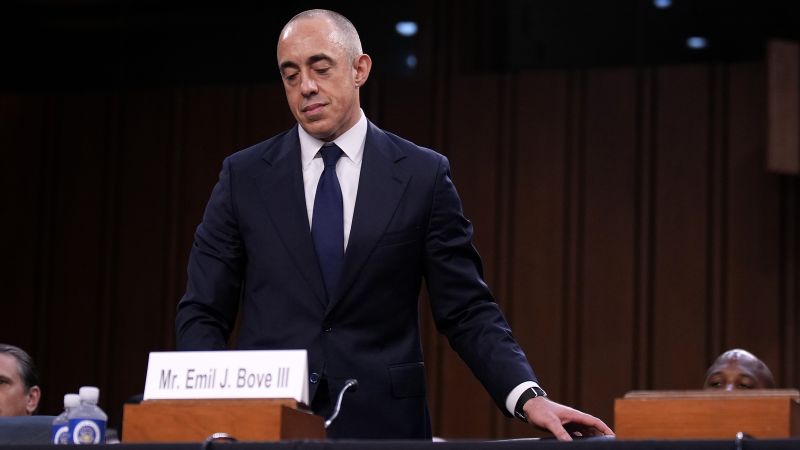In recent developments within the realm of U.S. immigration law, allegations have surfaced concerning Emil Bove, a top official in the Department of Justice (DOJ) nominated for a judgeship. A whistleblower formally approached the DOJ’s Office of Inspector General, asserting that Bove suggested he and other agency officials should disregard court orders during a contentious legal battle tied to immigration enforcement issues.
This whistleblower, a former DOJ attorney linked to the Office of Immigration Litigation, revealed to CNN that documentation supporting their claims had been submitted to the DOJ’s internal watchdog. This disclosure appears to corroborate another whistleblower’s previous complaints against Bove, which implicated him in deceitful practices aimed at influencing federal judges amid the administration’s aggressive deportation strategies earlier this year.
The whistleblower expressed grave concerns about the implications of Bove securing a lifetime appointment as a federal appellate judge. Highlighting Bove’s perceived lack of respect for federal court authority and the DOJ attorneys mandated by law to represent the United States, the whistleblower asserted, “I think it would be incredibly dangerous for someone like that to have a lifetime appointment.”
Bove’s actions came under increased scrutiny when Erez Reuveni, another immigration law specialist associated with the case of Kilmar Abrego Garcia—a mistakenly deported immigrant—made similar claims in a whistleblower letter submitted in June. Following this public revelation, the original whistleblower chose to disclose their own earlier report to the DOJ inspector general just ahead of Bove’s Senate confirmation vote, escalating concerns over his appointment.
Despite the rising tensions surrounding Bove’s nomination, the Justice Department responded to the allegations by reaffirming their support for him. A spokesperson commented that “Emil Bove is a highly qualified judicial nominee who has done incredible work at the Department of Justice,” asserting that the department’s loss would be a benefit for the Third Circuit.
However, the complexities of Bove’s judicial history cannot be overlooked. Bove previously served as a personal attorney to former President Donald Trump, where he defended Trump against various federal criminal charges. Notably, he made headlines related to Trump’s indictment in the New York hush-money case, where Trump faced multiple charges.
The ongoing allegations have prompted Bove to reject the claims brought forth by the first whistleblower, which included assertions made during a March meeting that Bove allegedly suggested the DOJ might need to disregard the courts if they obstructed Trump’s immigration policies. During his Senate confirmation hearing, Bove claimed he had “no recollection” of such comments.
In his defense, Bove maintained that he has never instructed a DOJ attorney to violate court orders. Moreover, amidst the growing controversies, his nomination has proceeded with significant bipartisan division, as evidenced by the support from 12 Republican members of the Senate Judiciary Committee in advancing his nomination, despite strong opposition from Democrats.
The latest whistleblower referenced the troubled atmosphere at the DOJ under the Trump administration, particularly after migrants were sent to El Salvador in violation of court orders. They articulated their decision to exit the department, stating, “It was not a place where I could continue to work.”
Furthermore, the Senate Judiciary Committee received correspondence in June regarding the whistleblower’s protected disclosure and urged the committee to coordinate with the DOJ inspector general to understand the investigation’s progress. Although the letter did not explicitly name Bove, it raised significant concerns about potential violations of law by senior DOJ officials, particularly in light of a Temporary Restraining Order issued in March 2025.
Amidst these pressing allegations, the whistleblower criticized Senate Republicans for seemingly prioritizing loyalty to Trump over thoroughly investigating Bove’s qualifications and any potential misdeeds. They asserted, “It appears Senate Republicans are not taking seriously Bove’s nomination because they would rather rush to confirm him.”
The accountability and proper scrutiny of judicial nominees are essential to maintaining public trust in the legal system. However, as the investigation continues, concerns remain about the Senate’s commitment to addressing these allegations adequately. A spokesperson for the Senate Judiciary Committee indicated that they have reached out to legal representatives linked to the whistleblower and the DOJ inspector general’s office, while the DOJ has not yet provided a comment on the ongoing situation. Amid this tumultuous backdrop, CNN’s Shania Shelton contributed insight into these developments.











